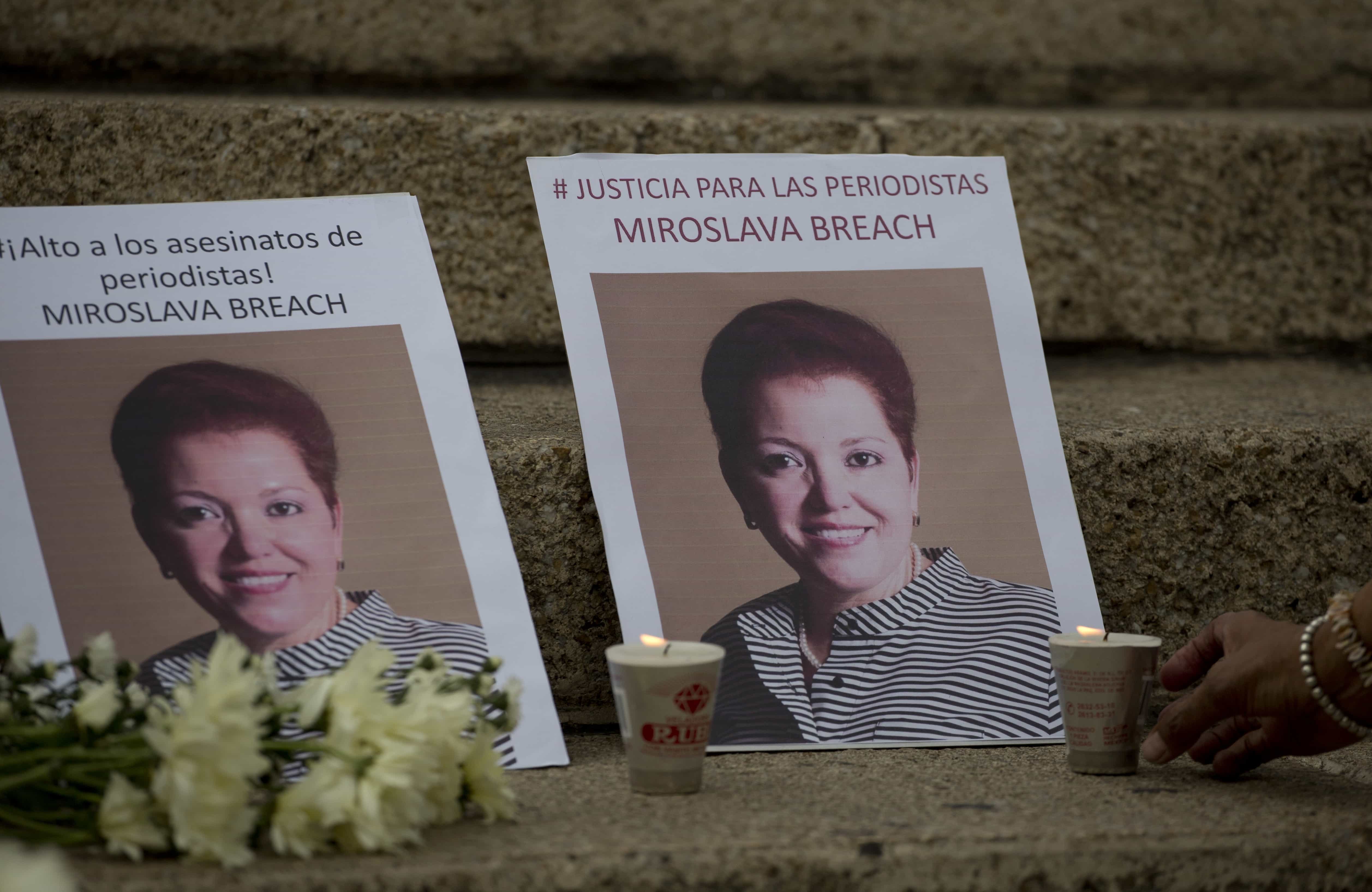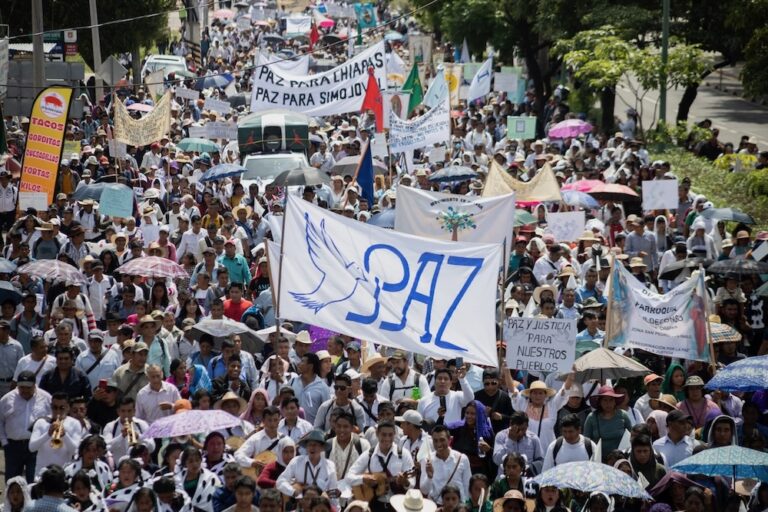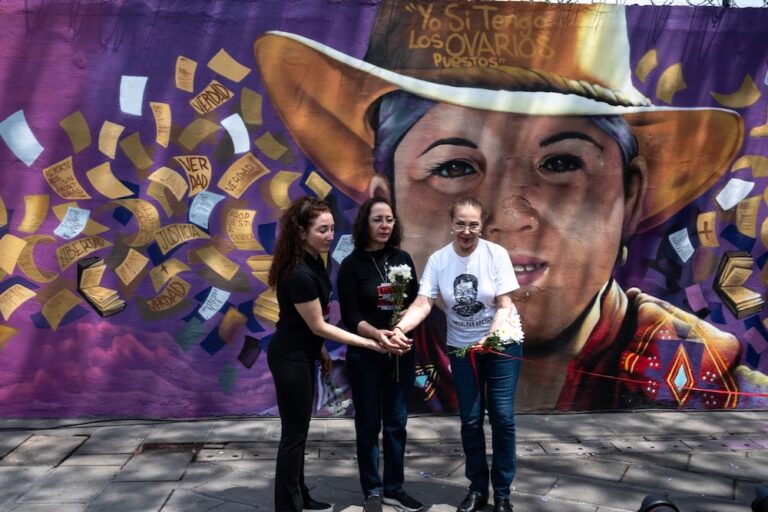Miroslava Breach Velducea, La Jornada correspondent, contributor to El Norte of Juárez, and director and owner of the MIR agency, was killed by gunshots on the morning of March 23, 2017, in the city of Chihuahua.
The following is a translation of an article originally published on articulo19.org on 23 March 2017.
Miroslava Breach Velducea, La Jornada correspondent, contributor to El Norte of Juárez, and director and owner of the MIR agency, was killed by gunshots on the morning of 23 March 2017, in the city of Chihuahua.
According to state authorities for public security, the journalist left her home in the Infonavit Nacional neighbourhood this past Thursday, in the morning, in her cherry-coloured Renault Duster truck. She was intercepted by an individual carrying a gun at 6:53 am, and this person, along with his fellow attackers, fled in a white-coloured sedan. The journalist was found with multiple bullet wounds to the head from a 9mm calibre gun.
The journalist had a long and recognised career in the state’s journalism, which included collaborations and positions with media outlets such as La Jornada, La Crónica de Hoy, Diario de Chihuahua, Periódico Norte of Ciudad Juárez, Semanario Concepto, Semanario La Opinión, TV Azteca and Heraldo of Chihuahua. Miroslava had also recently founded the MIR agency, which submitted content on the city of Chihuahua to the Norte newspaper of Ciudad Juárez.
Rolando Nájera, reporter and Miroslava’s co-worker at the MIR agency, told ARTICLE 19 that “she was an excellent person and an excellent boss; a very strong woman, really courageous. A very kind and direct woman. [She was] very much admired by those who have worked with her, by her fellow journalists. It’s a great loss for Chihuahua, because I can assure you that the best journalist in the state is gone and she was taken from us by criminals. We don’t know why. But obviously it has to do with her being a journalist.”
According to close colleagues, she mainly covered politics and security, although she didn’t focus exclusively on these matters.
Guadalupe Salcido, Director of Information and Content at the newspaper El Norte, told this organisation that the journalist coordinated the Don Mirone column at that media outlet, and that she covered topics that made people uncomfortable: “Recently, she led an extensive investigation as a result of the Minister of Public Security of Ciudad Juárez being dismissed, and although more of us journalists were involved, she was the one who led the way in this case. In more recent months, she also published [articles] on the legacy of corruption that the César Duarte Jáquez administration left the state of Chihuahua; and this was in addition to providing timely coverage of the conflict sustained by organised criminal groups in the mountains of Chihuahua, exposing those who have turned that region of the state into lawless land.”
One of her closest colleagues at the MIR agency – who decided to remain anonymous due to safety concerns – added in an interview with ARTICLE 19 that she was looking into “several embarrassing cases regarding relationships between drug traffickers and the municipalities, or regarding how the police plant those same drug traffickers and about the business dealings and agreements between them. [Miroslava Breach] was also involved in turf dispute issues in the Sierra Tarahumara.”
In recent remarks, she addressed issues of state interest-related corruption and conflict, clandestine graves in El Lago Maderal, and violence and protests; furthermore, during her career as a journalist, Breach covered cases of femicide and gender-based violence in Chihuahua, extensively.
According to several of her colleagues, she was also an important writer and voice on human rights violations. She documented and made public the murders of Isidro Baldengero and Juan Ontiveros, environmental advocates for the Sierra Tarahumara. Similarly, Paola Sáenz, member of the Centre for Women’s Human Rights A.C. (Centro de Derechos Humanos de las Mujeres A.C.) told ARTICLE 19 that Breach was part of a group of journalists that launched the request for an “Early Warning” process for journalists and human rights defenders in the state, adopted in August of 2016 by the Mechanism to Protect Human Rights Defenders and Journalists (Mecanismo de Protección a Personas Defensoras y Periodistas) of the Department of the Interior (Secretaria de Gobernación). She was also closely involved with the organisation Bowerasa, which works to defend the rights of the Rarámuri and El Barzón communities, in the fight to protect water.
Her colleagues aren’t sure where the plan to murder her could have come from as she covered all kinds of issues involving the state that made people uncomfortable, both for public and private entities. However, three of them did say that the journalist had received threats in the past, though she didn’t speak much about this.
In just 20 days, ARTICLE 19 has also documented the murders of journalists Cecilio Pineda, in Guerrero, and Ricardo Monlui, in Veracruz, which brings the registered total of journalists murdered, from 2000 to date, to 103 – 13 of which died in Chihuahua. It is therefore the state with the second most murders of journalists – after Tamaulipas – in the country.
The murder of three journalists in less than one month – coupled with the fact that 2016 has been the most lethal year for the press – demonstrates the failure of institutions at different levels of government to address the issue of violence against the press. Similarly, it reveals a total lack of State policy to protect the free exercise of journalism; and although resources and initiatives do exist, they are fragmented and out of touch.
Not only are laws, institutions and government declarations necessary, but genuine State policy is also required. [This policy] must be focused both on violence prevention and investigating incidents of assault in order to end the vicious circle of impunity in the murders of journalists.
This is why ARTICLE 19 demands that the Office of the Special Prosecutor for Crimes against Freedom of Expression (Fiscalía Especial para la Atención a delitos cometidos contra la Libertad de Expresión, FEADLE), of the federal Attorney General’s Office (Procuraduría General de la República, PGR), promptly, thoroughly, impartially and efficiently investigate the murder of Miroslava Breach, in conformity with international standards. The fact that there is 99.75% impunity in cases of journalists is a clear incentive for these crimes to continue to occur.
This organisation also calls on the State Government of Chihuahua to carry out any necessary measures in order to put an end to violence against journalists and human rights defenders, and to guarantee the exercise of freedom of expression in the state.
It’s alarming that two human rights defenders – Isidro Baldenegro and Juan Ontiveros – have been murdered in Chihuahua in only four months (January and February, respectively), as well as two journalists, Adrián Rodríguez Samaniego, in December of last year, and now, journalist and advocate Miroslava Breach, in March.
ARTICLE 19 urges the Mechanism to Protect Human Rights Defenders and Journalists of the Department of the Interior to safeguard the physical and psychological well-being of family members and journalists close to Miroslava Breach.
Despite the adoption of the “Early Warning” approach in August of 2016 and the meetings that took place in Chihuahua in the month of March, the contingency plan has yet to be put into effect. As a result, the Government of the State of Chihuahua and the Mechanism to Protect are called upon to work together in order to accelerate and guarantee the development and functioning of said plan.
In the absence of State response, ARTICLE 19 is also calling upon civil society – primarily journalists and the media – to demand justice for murdered journalists and an end to the crisis of violence against freedom of expression that exists in the country. It’s important to recognise and make visible the fact that journalists and human rights defenders are the ones speaking out in a country gripped by a crisis of attacks on human rights, violence and corruption.



